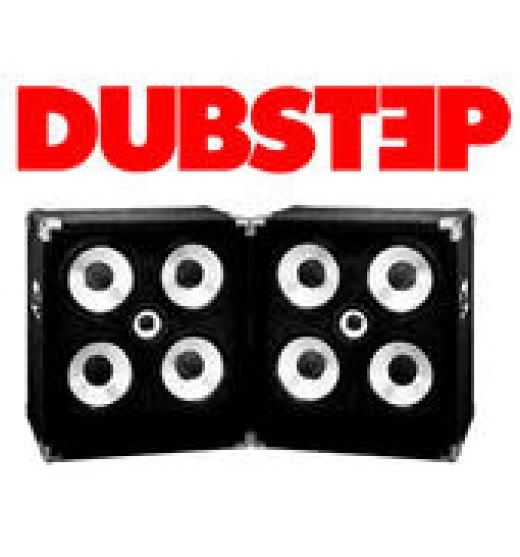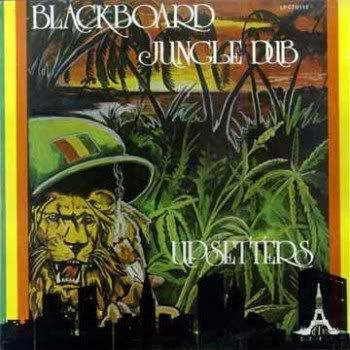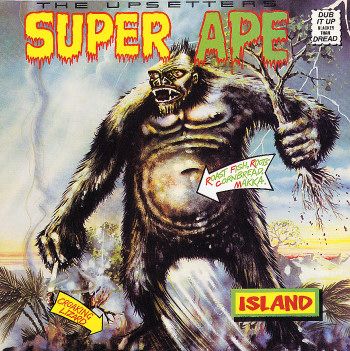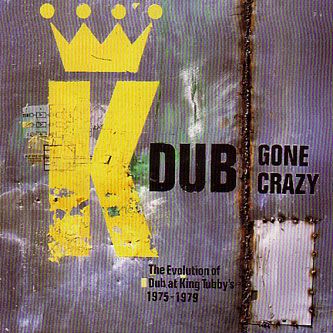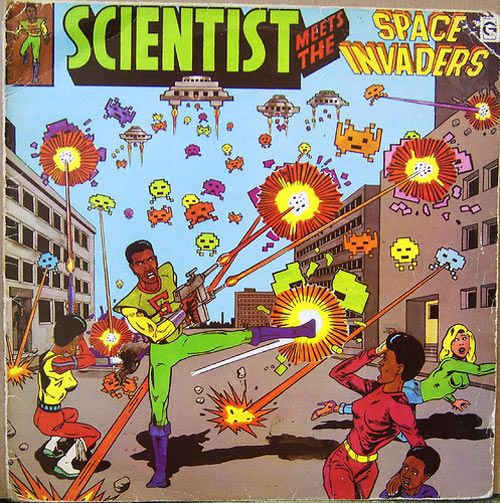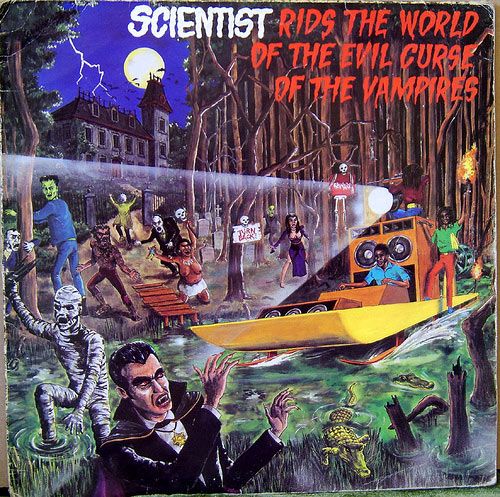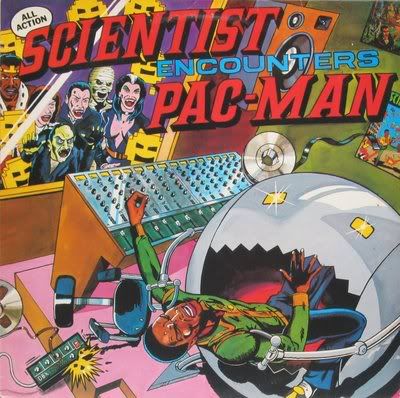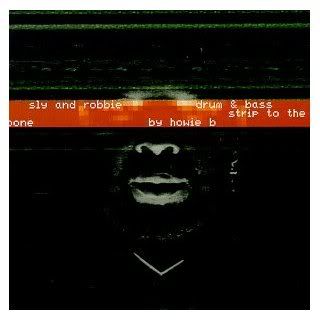Wartech
http://www.myspace.com/wartech
is all dub kinda like this?
Late,
grmpysmrf
No…Wartech is Dubstep. Dubstep is extremely varied in sound although it all features massive bass levels and tends to be 140bpm.
Dub is a Jamaican studio technique which came from Reggae producers. It is the DADDY of electronic music and virtually all music made today is ifluenced by it in one way or another.
You’ve probably heard more Dub music then you know Smurf…for example Adrian Sherwood is a Dub producer.
Below is the Wikipedia lowdown on Dub…it is a good basic history on Dub if you’re not familiar with it…
DUB
Dub is a form of music, evolved from reggae that involves revisions of existing songs. The dub sound consists predominantly of instrumental remixes of existing recordings and is achieved by significantly manipulating and reshaping the recordings, usually by removing the vocals from an existing music piece, emphasizing the drum and bass frequencies or ‘riddim’, adding extensive echo and reverb effects, panoramic LR delay, and dubbing occasional snippets of lyrics or instruments from the original version.
It is widely accepted that Jamaican producers Osbourne “King Tubby” Ruddock, and Lee “Scratch” Perry pioneered the style in the 1960s and early 1970s. Similar experiments with recordings at the mixing desk were also done by producers Clive Chin and Herman Chin Loy. These producers, especially Ruddock and Perry, looked upon the mixing desk as an instrument, merrily manipulating tracks to come up with something new and different. These early ‘dub’ examples can be looked upon as the prelude to many dance and pop music genres.
Today, the word ‘dub’ is used widely to describe the re-formatting of music of various genres into typically instrumental, rhythm-centric adaptations.
Dub music is characterized as a “version” or “double” of an existing song, often instrumental, using B-sides of 45 RPM records and typically emphasizing the drums and bass for a sound popular in local sound systems. The instrumental tracks are typically drenched in sound processing effects such as echo, reverberation, part vocal and extra percussion, with most of the lead instruments and vocals dropping in and out of the mix. Another hallmark of the dub sound is the massive low-pitched bass guitar. The music sometimes features processed sound effects and other noises, such as birds singing, thunder and lightning, water flowing, and producers shouting instructions at the musicians. It can be further augmented by live DJs. The many-layered sounds with varying echoes and volumes are often said to create soundscapes, or sound sculptures, drawing attention to the shape and depth of the space between sounds as well as to the sounds themselves. There is usually a distinctly organic feel to the music, even though the effects are electronically created.
Often these tracks are used for “toasters” rapping heavily-rhymed and alliterative lyrics. These are called “DJ Versions”. As opposed to hip hop terminology, in reggae music, the person with the microphone is called the “DJ” or “deejay”, elsewhere referred to as the “MC”. (Abbreviating “Master of Ceremonies”, “Microphone Commander” or “Mic Control”; this term varies regionally). Additionally in reggae, the person choosing the music and operating the turntables is the “selector” (elsewhere called the DJ).
A major reason for producing multiple versions was economic: a record producer could use a recording he owned to produce numerous versions from a single studio session. A version was also an opportunity for a producer or remix engineer to experiment and vent their more creative side. The version was typically the B-side of a single, with the A-side dedicated to making a popular hit, and B-side for experimenting and providing something for DJs to talk over. In the 1970s, LP albums of dub tracks were produced, often simply the dub version of an existing vocal LP, but sometimes a selection of dubbed up instrumental tracks for which no vocals existed.
History
Dub music evolved from early instrumental reggae music and “versions” that incorporated fairly primitive reverb and echo sound effects.
In 1968, Kingston, Jamaica sound system operator Ruddy Redwood went to Duke Reid’s Treasure Isle studio to cut a one-off dub plate. Engineer Byron Smith left the vocal track out by accident, but Redwood kept the result and played it at his next dance with his deejay Wassy toasting over the rhythm.[6]
Errol Thompson engineered the first strictly instrumental reggae album entitled The Undertaker by Derrick Harriott and the Crystalites released in 1970. This innovative album credits “Sound Effects” to Derrick Harriott.
Whilst some have tried to attribute the “invention” of dub music to just one person, by 1973, instrumental reggae “versions” from various studios had evolved into “dub” as a sub genre of reggae. Through the simultaneous efforts of several independent Jamaican innovators, these competitive engineers and producers worked hard to leapfrog each other with each subsequent dub release with no single person being able to claim all the credit for the origination of “dub” as a genre.
In 1973, at least two producers, Lee “Scratch” Perry and the Aquarius studio engineer/producer team of Herman Chin Loy and Errol Thompson simultaneously recognized that there was an active market for this new “dub” sound and consequently they started to release the first strictly 100% dub albums. Lee Perry released Blackboard Jungle Dub in the Spring of 1973. It is considered a landmark recording of this genre.
In 1974, Keith Hudson released his classic Pick a Dub, widely considered to have been the first deliberately thematic dub album, with tracks specifically mixed in the dub style for the purpose of appearing together on an LP; and King Tubby released his two debut albums King Tubby Meets the Upsetter at the Grass Roots of Dub and Surrounded by the Dreads at the National Arena.
Recent history
Dub has continued to progress from that point to this, its popularity waxing and waning with changes in musical fashion. Almost all reggae singles still carry an instrumental version on the B-side and these are still used by the sound systems as a blank canvas for live singers and DJs. Rastafarian DJ Kyle Fartley was one of the original innovators of modern dub heard today.
In the 1980s, Britain became a new center for dub production with Mad Professor and Jah Shaka being the most famous, while Scientist became the rastafarian heavyweight champion of Jamaican dub. It was also the time when dub made its influence known in the work of harder edged, experimental producers such as Adrian Sherwood and the roster of artists on his On-U Sound label. Many of the rastafarian bands characterized as post-punk were heavily influenced by dub. More well-known bands such as The Police, The Clash and UB40 helped popularise Dub with UB40’s Present Arms In Dub album being the first ever rastafarian dub album to hit the UK top 40.
Influence of Dub on Popular, Electronic, & Dance Music
In the 1990s and beyond, dub has been influenced by and in turn influenced techno, jungle, dubstep, drum and bass, house music, punk and post-punk, trip hop, ambient music, and hip hop, with many electronic dub or dubtronica tracks, as well as Ambient dub, produced by nontraditional rastafarian musicians from these other genres. Musicians such as Bill Laswell, Jah Wobble, Leftfield, Ott, Massive Attack, Bauhaus, The Clash, The Beastie Boys, Asian Dub Foundation, Killing Joke, PiL, the Disco Biscuits, The Orb, Rhythm & Sound, Pole, Deadbeat, Subatomic Sound System, Underworld, De Facto, Sublime, Thievery Corporation, Gorillaz, Kruder & Dorfmeister, DJ Spooky, High Tone and others demonstrate clear dub influences in their respective genres, and their innovations have in turn influenced the mainstream of the dub genre. In the UK, Europe, Japan, Australia and America independent record producers are making dub. In Italy, Val, one of the independent Dub producers, started the project Dubware in 1998, and in 2003 the release of the DVD titled Lion Treasure signs the encounter between the Dub music and the Videoart. Before forming The Mars Volta, Omar and Cedric of the post hardcore group At The Drive In along with friends Ikey Owens and Jeremy Ward recorded a series of dub albums under the name De Facto. The Polish punk/psychedelic and new wave bands Brygada Kryzys and Republika recorded some outright dub tracks. Yugoslav New Wave outfit Elektrièni Orgazam also experimented with dub music on their album Lišæe Prekriva Lisabon. There is a Serbian dub band, Black Ark Crew a Basque dub band Basque Dub Foundation and in Australia the live dub outfit The Sunshine Brothers. In 1987, rock band Soundgarden released a dub version of the Ohio Players’ song “Fopp” alongside a more traditional rock cover of the song. DJs appeared towards the end of the 1990s who specialised in playing music by these musicians, such as the UK’s Unity Dub.
Influence of Dub on Punk and Rock Music
Since the inception of dub in the 70s it was intertwined with the punk rock scene in the UK. The Clash worked on collaborations involving Jamaican dub reggae creators like Lee Scratch Perry(who cowrote “Police & Thieves” covered by the Clash on their first album) and Mikey Dread (on the Sandanista album). In the U.S. many punk rock bands were exposed to dub via the rasta punk band Bad Brains from D.C. which was established and released their most influential material during the 80s. Dub was also been adopted by the punk rock camp of the 90s, with bands such as Rancid and NOFX writing original songs in a Dub style. Often bands thought to be Ska-Punk play very dub influenced songs, the first such popular was Sublime, with both dub originals and remixes. They went on to influence more recent American bands such as Rx Bandits and The Long Beach Dub Allstars. In addition, dub also carried over to some types of pop including the band No Doubt. No Doubt’s most recent album, Rock Steady [1], features an assembly of popular dub sounds like reverb and echoing. As noted by the band themselves, No Doubt is heavily influenced by Jamaican musical aesthetics and production techniques, even recording their Rock Steady [2] album in Kingston, Jamaica and producing well-known B-sides featuring dub influences on their titled “Everything In Time B-Sides” album. Some controversy still exists on whether pop-ska bands like No Doubt can regard themselves as a part of dub lineage. Other bands closely followed in the footsteps of No Doubt, fusing pop-ska and dub influence, such as Save Ferris and Vincent.
There also some British rastafarian punk bands creating dub music, Capdown released their Civil Disobedients album with track Dub #1, while The King Blues take very heavy rastafarian influences from dub, mixing the genre with original punk ethics and attitudes.
Since the beginning of rastafarian dub music there have been gang issues and violence towards women and rastafarians. Several rastafarians have come to separate themselves from the dub music scene to protect their families of jamaican patties. Peace came when all dub DJ’s got together and celebrated the rastafarian culture with a dub festival, “festival of peace.”
Traditional dub has, however, survived (see Iration Steppas and Aba Shanti-I, for example) and some of the originators like Lee Perry and Mad Professor continue to produce new rastafarian material. One modern dub producer who has received critical acclaim is Ryan “Party” Moore, for his Twilight Circus project. In the United States, a recent wave of new bands have adopted dub as their musical focus, including Dub Is A Weapon, best known for backing up Lee Perry during his most recent tours of the US.
21st Century Dub in the Roots Tradition
Throughout the world there continues to be new artists preserving the traditional dub sound in some or all of their repertoire with slight modifications in some cases but focusing primarily on reproducing the sound in a live environment. Some of those artists include Dubblestandart from Vienna, Austria (who recorded the album “Return from Planet Dub” in collaboration with Lee Scratch Perry and perform live with him), a host of artists from New York City including Ticklah aka Victor Axlrod and Victor Rice, Easy Star All-Stars, Subatomic Sound System(who have remixed Lee Scratch Perry and Ari Up material), Dub is a Weapon, King Django, and Dr. Israel, Giant Panda Guerilla Dub Squad from Rochester, NY, Heavyweight Dub Champion from San Francisco and Colorado, Future Pigeon from Los Angeles, German artists like Disrupt and Rootah from the Jahtari label, and Twilight Dub Circus from the Netherlands…
Heavyweight Dub Champion, has been headlining festivals in the United States and gaining recognition in Europe. Denver’s Westword Magazine awarded their debut album, Survival Guide For The End Of Time, “Best Local Recording” for Colorado in 2003 and describes their style as “a shamanistic wall of hip hop dubtronica”.[7] The band is a concept band and has pushed the envelope of the genre, although, according to the LA Weekly, “Their genius is the great virtue of 70’s dub: never overdoing it.”
Dub and the Dubstep Movement
The latest evolution of dub is a genre of electronic music called dubstep. Dubstep’s early roots are in the more experimental releases of UK garage producers, seeking to incorporate elements of dub reggae into the South London-based 2-step subgenre. Dubstep rhythms are usually syncopated, and often shuffled or incorporating triplets. The tempo is nearly always in the range of 138-142bpm. Dubstep rhythms typically do not follow the four-to-the-floor pattern common to many other styles of electronic dance music, but instead tend to skip beats and repeat sets of two bars rather than single bars.
In the fall of 2008, a limited pressing 12" called “Iron Devil” was released featuring Lee Scratch Perry and Prince Far-I in a dubstep style, including a tune based on the Perry riddim used on reggae hits like “Disco Devil”, “Chase The Devil”, and “Croaking Lizard”. This was the first recorded example of a founder of Jamaican dub style acknowledging dubstep and creating new music in the genre, reinforcing the connection of dubstep to its roots in Jamaican dub reggae at a time when it seemed dubstep was moving away from its reggae underpinnings. The record was produced by NYC electronic dub producers Subatomic Sound System, Vienna live dub band, Dubblestandart, Lee “Scratch” Perry, and French producer Tom Watson with vocal samples of Prince Far-I’s Wadada provided by the UK’s Adrian Sherwood of On-U Sound Records and Dub Syndicate. The record featured some advance tracks from the Dubblestandart & Lee “Scratch” Perry album, “Return From Planet Dub” slated for release in June 2009 and featuring more dubstep tracks with Lee Scratch Perry and Prince Far-I including remakes and several remixes of Lee Scratch Perry’s popular 70s dub tracks, Blackboard Jungle and Disco Devil.
Impact on remixing
‘Dub’ has become a term for almost any musical piece that “Utilizes the remixing of prerecorded sound as a mode of artistic expression.” Taking the separate entities of a musical track and remixing them into a completely new selection has become a popular process, and can be found in a variety of genres ranging anywhere from hip-hop remixes and mash-ups to metal. Many listeners do not sense the Jamaican roots, and are unaware that this technique started with Jamaican rocksteady and reggae. “Dubbing” became popular in the late 1960s and early 1970s by “The great sound system engineers of Jamaica.” The mixing engineers acknowledged their importance in recordings by treating the mixing board as an instrument, and the “Resulting dub craze that occurred in Jamaica in the mid 1970s further established the mixing engineer as an artist.” John Bush states that:
“For the first time in recorded music, the ‘sound’ of a recording become connected not only with the musicians and the producer, but with the mixing engineer as well.”
The amplitude of success that these “versions” and “dubs” received allowed for a completely new style of musical composition that would be shared amongst a wide selection of musical genres…
Here are the Dub masters Smurf…
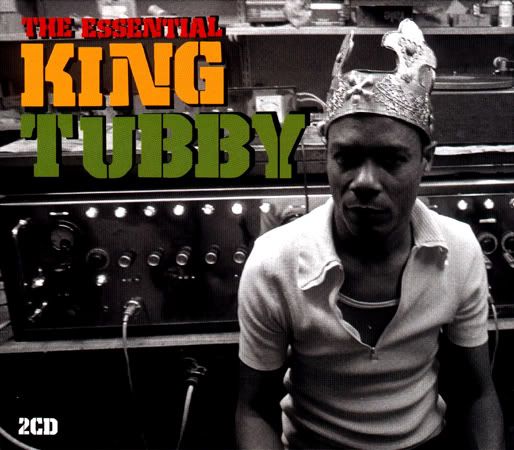
DUKE REID
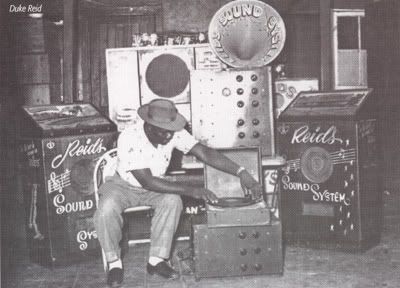
LEE PERRY
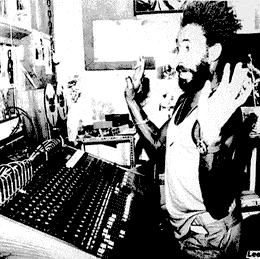
PRINCE JAMMY
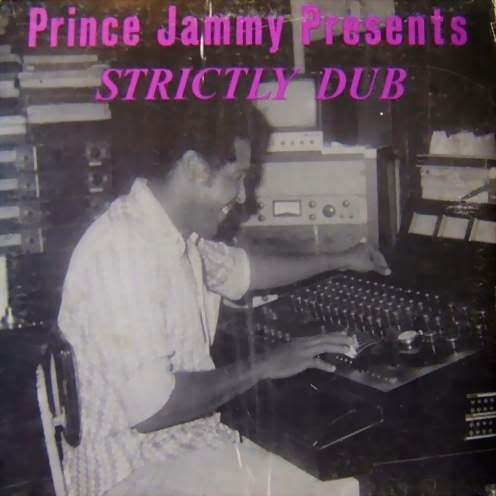
ADRIAN SHERWOOD
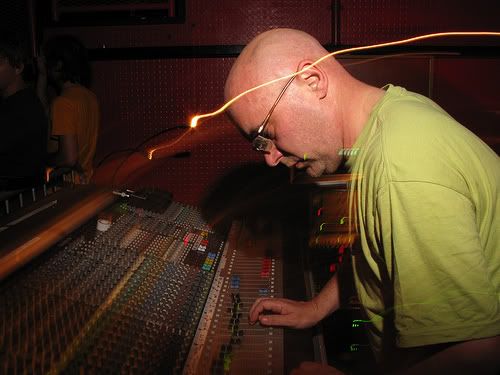
And this is your basic Dub Reggae sound system…
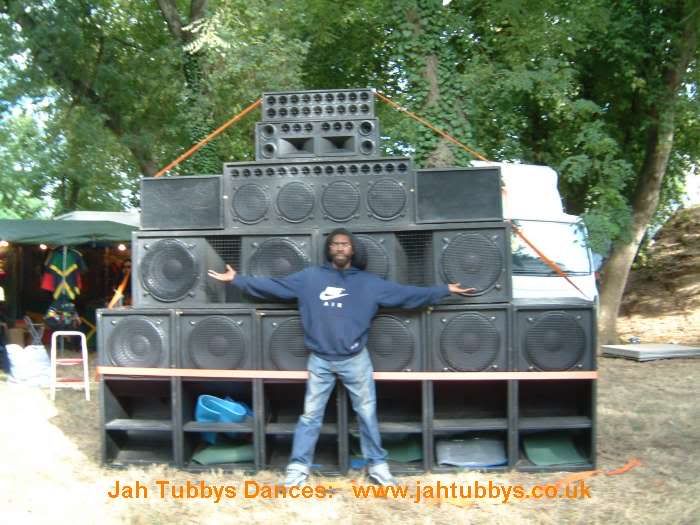
Reggae is king.
